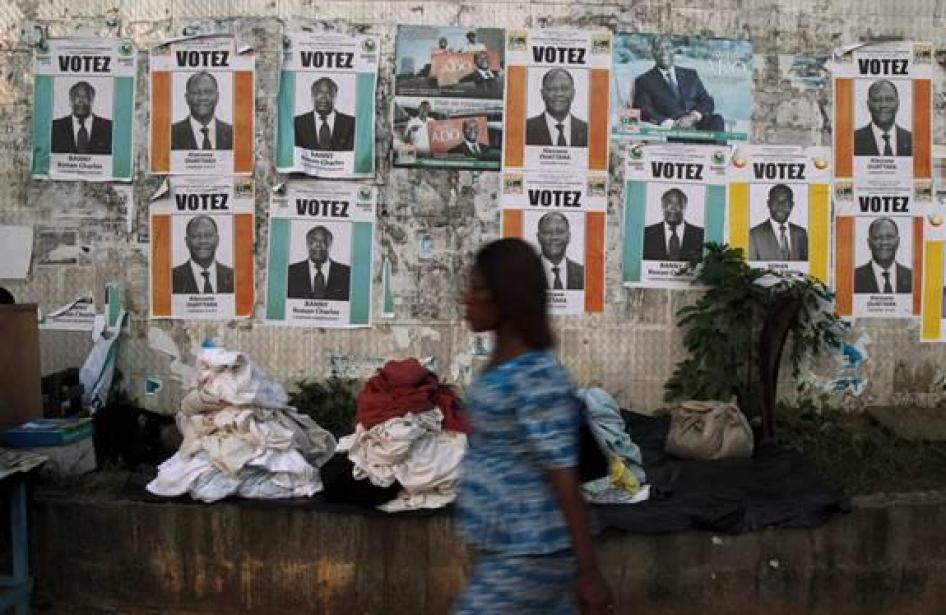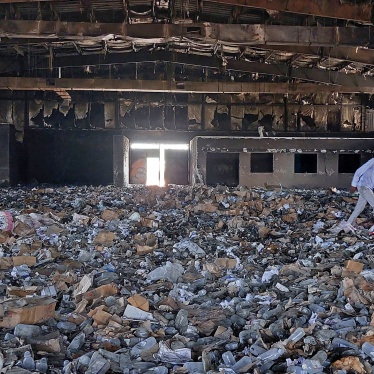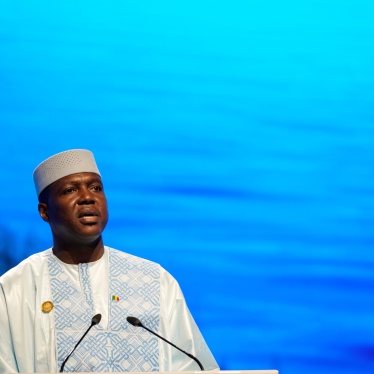President Alassane Ouattara, the victor in Côte d’Ivoire’s October presidential election, has begun to formulate a reform agenda for his second term. Dismantling the culture of impunity that fuels human rights abuses in Côte d’Ivoire should be at the top of his list – from providing justice for the unspeakable killings and rapes committed during the 2010-2011 post-election crisis to calling a halt to the more insidious corruption that many Ivorians encounter day after day.
Over the last year, while researching a new report that assesses the progress made during President Ouattara’s first term, I’ve spoken to dozens of Ivorians about the direction their country is heading.
Many people told me that Côte d’Ivoire has made significant progress since the post-election crisis, when the refusal of then-president Laurent Gbagbo to cede power to Ouattara led to an armed conflict in which more than 3,000 civilians were killed and scores of women raped.
Ivorians, particularly in the country’s booming capital, say they are proud of Côte d’Ivoire’s strong economic growth, and hope it will lead to tangible improvements in their children’s education and health care.
And yet President Ouattara’s resounding victory, albeit in an election in which only 6.3 million of the country’s approximately 22 million people were registered to vote, belies the fact that Côte d’Ivoire remains divided along political and, to a lesser extent, ethnic lines. Many people who supported Gbagbo in 2010, even those who are not clamoring for his return, say they remain distrustful of Ouattara’s government.
In 2011, Côte d’Ivoire established a dialogue, truth, and reconciliation commission to provide recommendations on how to nurture reconciliation. But the government has refused to publish the commission’s report, and some Ivorians assume that its contents criticize Ouattara’s government. One opposition supporter told me, “The report hasn’t been published – do you really think that means it’s favorable to the regime in power?”
People whose family members were killed by pro-Ouattara forces during the 2010-2011 crisis say the failure to hold those responsible accountable in court fuels their hostility toward Ouattara’s government. One village chief in western Côte d’Ivoire, considered Gbagbo’s political heartland, told me, “If reconciliation has not succeeded, it’s because of the lack of justice.”
Many Ivorians also express frustration with the government’s failure to clamp down on the corruption that deprives their families, already struggling to make ends meet, of vital revenue. In rural areas in the country’s west, farmers told me that, when they travel to local markets to sell their crops, they have to pay bribes at illegal checkpoints set up by soldiers and gendarmes. A unit set up in 2011 to investigate extortion has been chronically under-funded, leading one of its officers to say that corrupt policemen and soldiers are “advocating for the death of our unit.”
The common thread that runs through many of the failures of Ouattara’s first term is that the government hasn’t ensured that those responsible for human rights abuses and economic crimes are held accountable, particularly members of the security forces. As one Ivorian jurist told me, “Too often, because it’s the military, the cases don’t go anywhere.”
Donors have invested millions of dollars in the justice system, rebuilding courts and repairing prisons, but haven’t pushed the government to address more entrenched problems, such as corrupt judges and executive interference in the judiciary. “Corruption is part of Ivorian society,” one Ivorian judge told me, saying that, “The justice sector is supposed to be society’s check and balance, and so if we’re corrupt, our society is out of balance.”
In Abidjan, the city’s economic recovery – which dominates the restaurant chatter of foreign investors – makes it easy to forget the challenges that still lie ahead in President Ouattara’s second term. He has promised to reform Côte d’Ivoire’s constitution, including through the creation of a vice-president position that may indicate his preferred successor, but he should also implement the constitutional and institutional reforms necessary to strengthen the rule of law.
Jim Wormington is an Africa researcher at Human Rights Watch.











